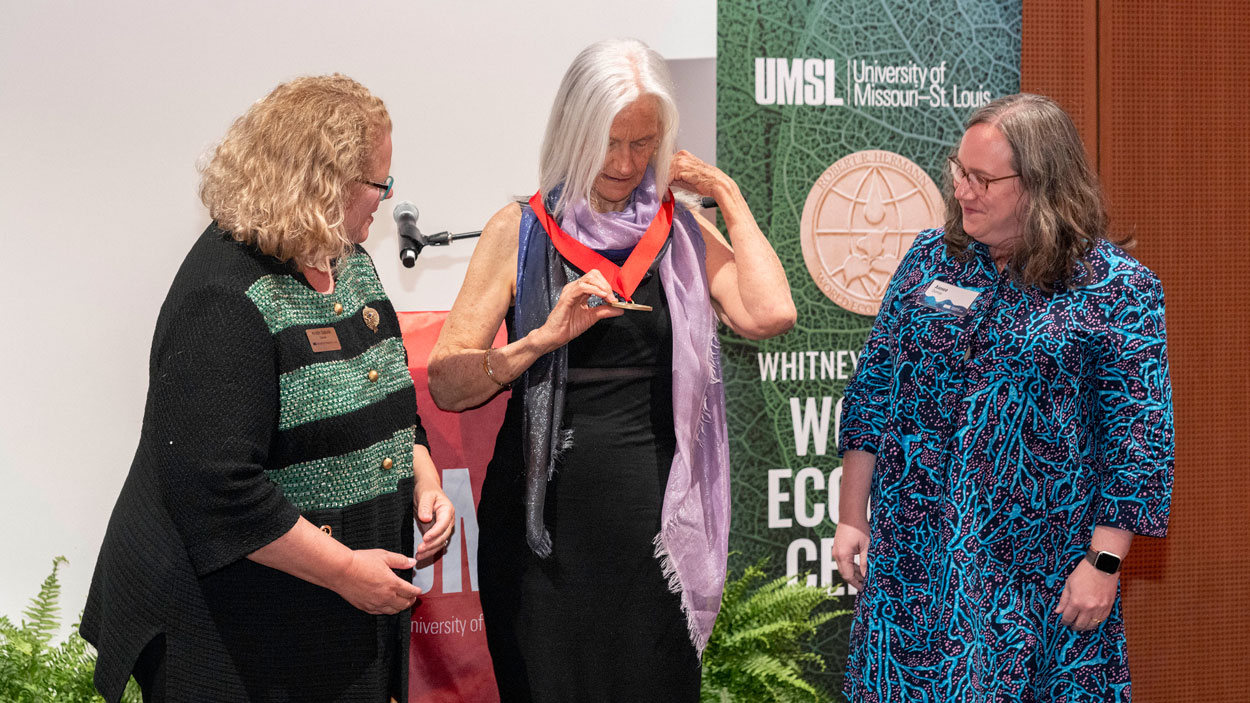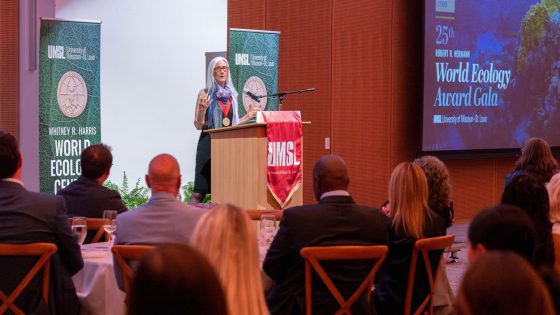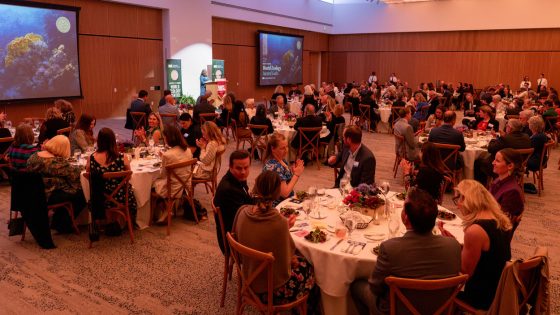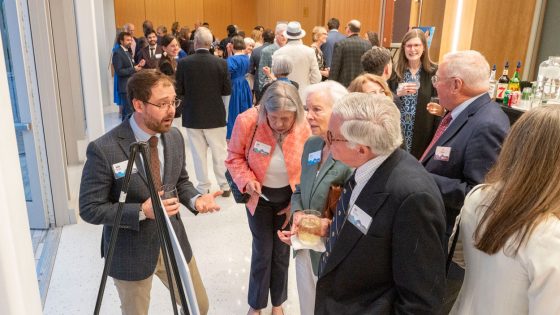
Julie Packard (center), the executive director of the Monterey Bay Aquarium, looks at the Robert R. Hermann World Ecology Award medal after accepting it from UMSL Chancellor Kristin Sobolik (at left) at a gala Tuesday night at the Missouri Botanical Garden. Aimee Dunlap (at right), the interim co-director of the Whitney R. Harris Center, introduced Packard, who became the 26th recipient of the award. (Photos by Derik Holtmann)
Julie Packard began working to establish the Monterey Bay Aquarium in the late 1970s and has served as its executive director since its opening 40 years ago.
In that time, the aquarium has become one of the most admired in the world, welcoming more than 2 million visitors per year, and Packard has used her platform as its leader to become a prominent voice promoting ocean health through sustainable seafood production, the reduction of ocean plastic pollution and measures to combat global climate change.
Packard, for her efforts, has been recognized as a fellow of the American Academy of Arts and Sciences and received numerous awards, including the Audubon Medal for Conservation, the National Marine Sanctuary Foundation‘s Lifetime Achievement Award and the California Coastal Commission‘s Coastal Hero Award.
On Tuesday, she added one more honor when she accepted the Robert R. Hermann World Ecology Award from the Whitney R. Harris World Ecology Center at the University of Missouri–St. Louis.

Monterey Bay Aquarium Executive Director Julie Packard addresses the audience after becoming the 26th recipient of the Robert R. Hermann World Ecology Award.
“Julie Packard is an international leader in the field of ocean conservation, a leading voice for science-based policy reform and support of a healthy ocean,” Harris Center Interim co-Director Aimee Dunlap said as she introduced Packard in front of an audience of about 150 people. “She demonstrates the significant impact that a dedicated individual can make.”
UMSL Chancellor Kristin Sobolik presented the award medal to Packard during a gala held in the Bayer Event Center at the Missouri Botanical Garden.
“Thank you, this is a wonderful honor,” Packard said after she became the 26th recipient of the award, which was created to recognize eminent individuals who have raised public awareness of global ecological issues and made significant contributions to environmental protection and biodiversity conservation.
Singer and activist John Denver was the first recipient of the World Ecology Award in 1990, and the list of honorees also includes such luminaries as Jacques Cousteau, Jane Goodall, Harrison Ford and E.O. Wilson. Packard fits neatly in their company.
Packard delivered a brief address after the award presentation, during which she talked about the origins of the Monterey Bay Aquarium and its goals to engage the public.
“My parents, David and Lucile Packard, created a foundation in 1965 and were doing a lot of environmental work, child health work,” Packard said. “The idea was brought forward by my sister” – marine biologist Nancy Packard Burnett – “and colleagues. We had all studied and done research in Monterey Bay, and we were just eager to share all the fascinating stories that we had learned in our studies. We were equally inspired by the experience of doing field research and being under the water surface and diving in the kelp forest, feeling the sway of the water and having a curious sea lion nibble on your fin. It was about sharing a feeling or fascination or obsession, really, of being in and on and under the sea.”

Nearly 150 people attended the Robert R. Hermann World Ecology Award Gala held Tuesday night at the Missouri Botanical Garden. Proceeds from the event support UMSL’s Whitney R. Harris World Ecology Center.
The aquarium has been lauded for the way it brings visitors in touch with the underwater world.
As it grew, it was natural that it would invest resources and energy into protecting the ocean and encouraging others to do the same. Its Seafood Watch program grew out of an exhibit created 25 years ago at the aquarium to teach visitors about a crisis in global fisheries, show them the importance of sustainability and help them make more educated choices in their seafood consumption.
“I strongly believe in the power of consumer-driven, market-based solutions,” Packard said. “The biggest driver of all these negative changes happening in our ecosystems and in the ocean, that all starts with all of us, all of our consumption of nature and our relationship with it, whether it’s energy, minerals, lumber, seafood – the list goes on.”
Packard also stressed the critical need to protect the oceans, even for people living in landlocked parts of the country, including Missouri.
“A healthy ocean is our best defense against climate change,” she said. “The ocean provides so many services that are mitigating those impacts. It absorbs 90% of the heat generated since the Industrial Revolution. Start right there. It’s absorbing CO2. But we need a living ocean to do all those things for us.”
It’s clear the environmental challenges facing the planet are immense, but Packard doesn’t allow them to overwhelm her, and she shared her optimism for the future with the audience while calling for action.
“We’ve made a lot of progress, and there’s a lot to celebrate, but bottom line is, there’s no time to lose,” Packard said. “Winning this race and slowing the pace of global climate change and its myriad impacts, which are often on those people that were most vulnerable, to at least be able to respond and survive and deal is going to take all the talent and the creativity and conviction that we can assemble.”

UMSL doctoral student John V. Bender discusses his research with guests attending the Robert R. Hermann World Ecology Award Gala. Attendees had a chance to meet and talk to several current UMSL students about their research during a cocktail hour preceding dinner and the presentation of the award to Montery Bay Aquarium Executive Director Julie Packard.
The gala serves as an important fundraiser toward that end by supporting the work of the Whitney R. Harris World Ecology Center. The center funds scholarships and provides research support for UMSL students as they pursue master’s and doctoral degrees in biology with a focus on ecology and conservation. Packard had an opportunity to have lunch with a collection of current UMSL graduate students in the Department of Biology on Tuesday.
Working in partnership with the Missouri Botanical Garden and the Saint Louis Zoo, the Harris Center has helped train more than 300 graduates in conservation science during its more than 30-year history. It has welcomed students from 45 different countries, and those students have often returned to their home countries to fill roles in research or policymaking after earning their degrees.
“Each and every one of us here can make an impact on the lives of our students and, by extension, the world, through support of the Harris Center,” Dunlap said as she brought the evening to a close. “Thank you for what you’ve done and will do to transform lives.”
To support the Whitney R. Harris World Ecology Center, please do so at giving.umsl.edu/ecologygala.
Media Coverage
St. Louis Public Radio














